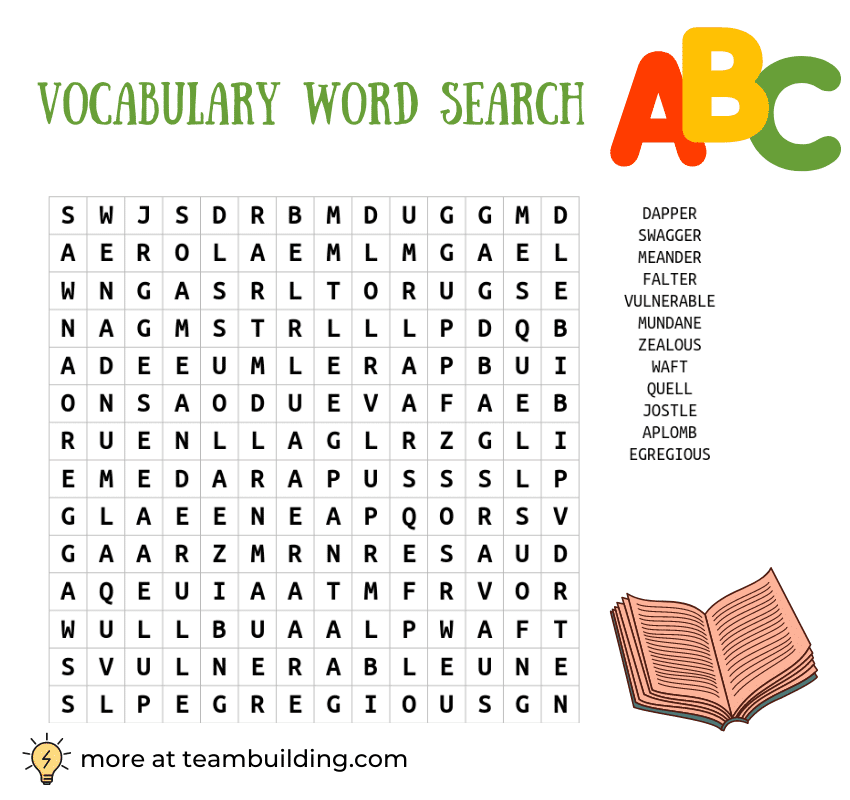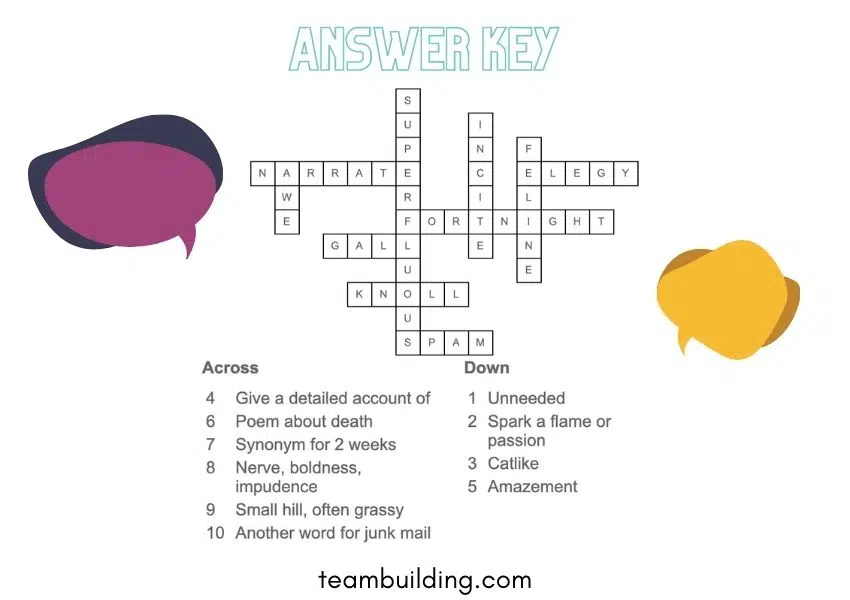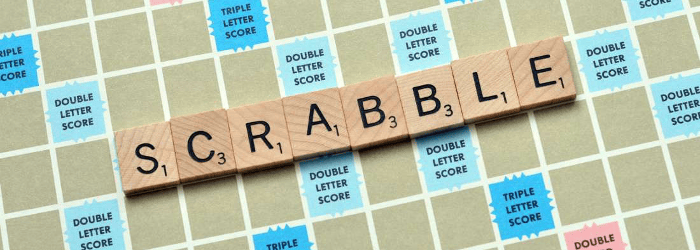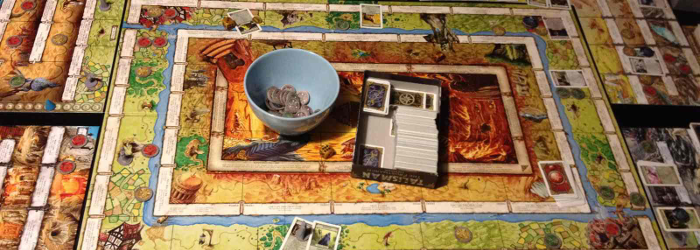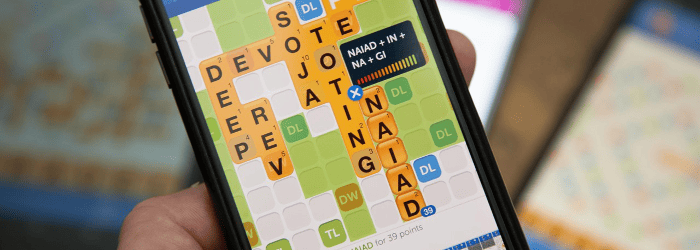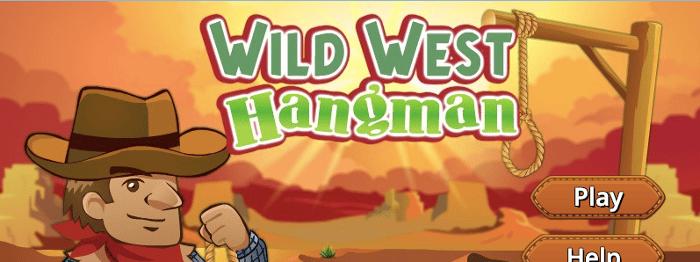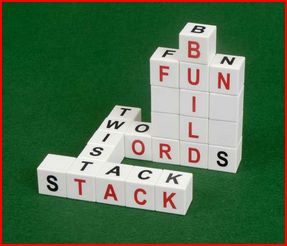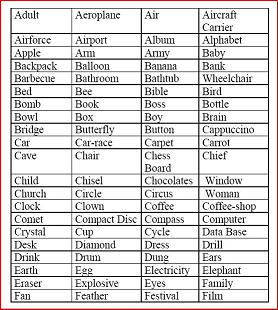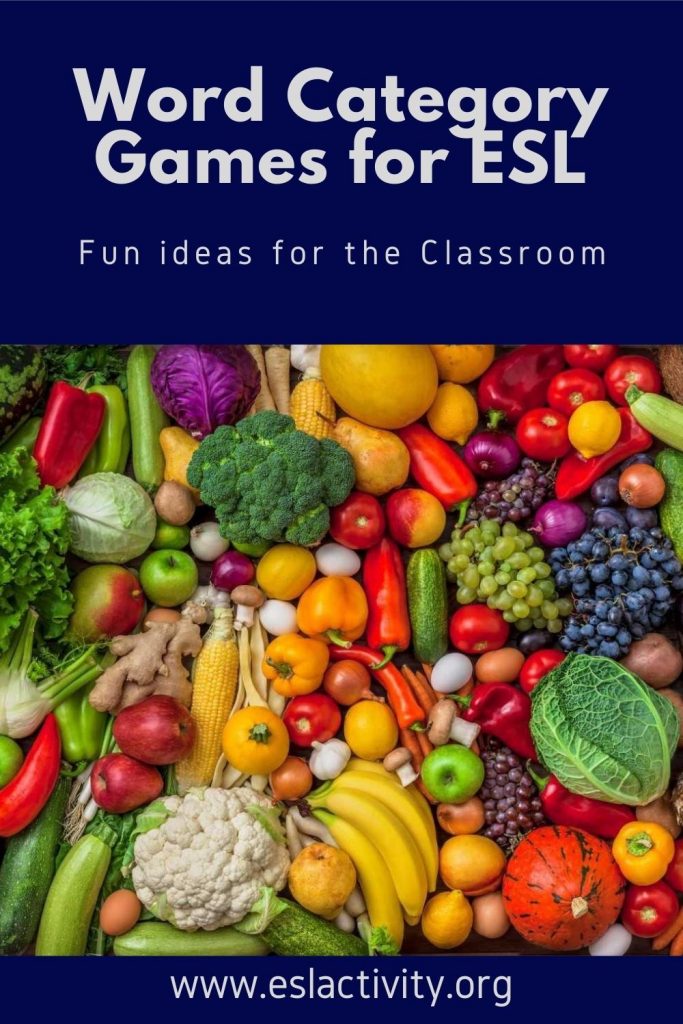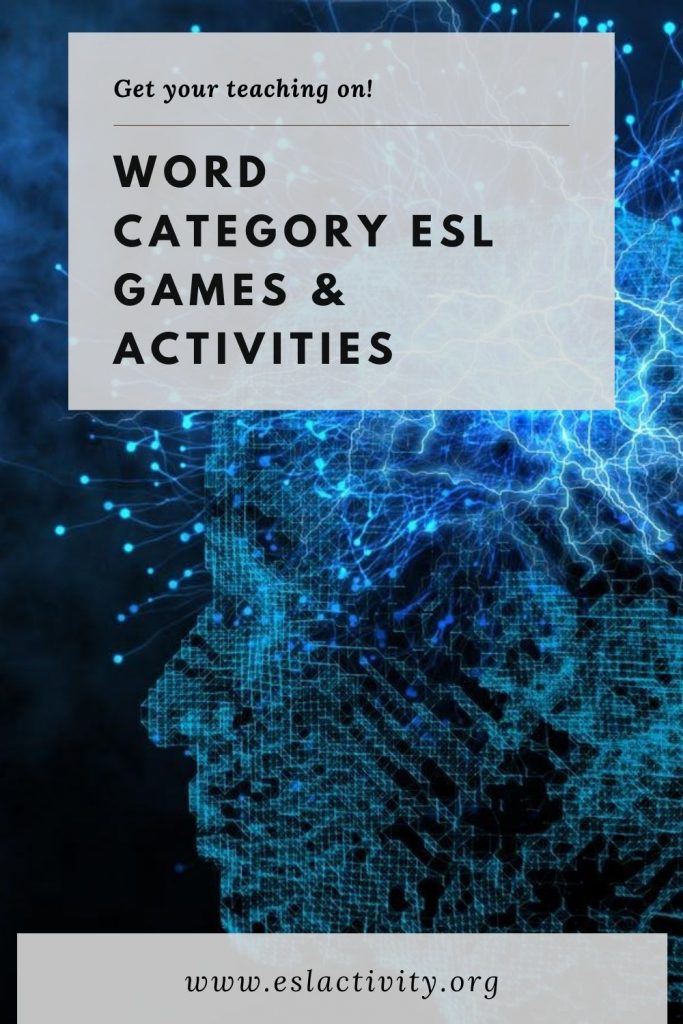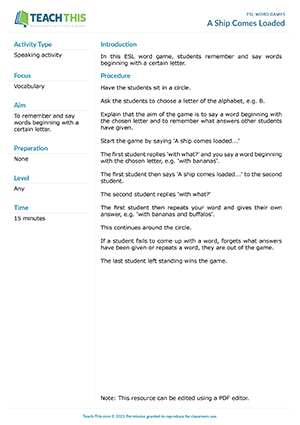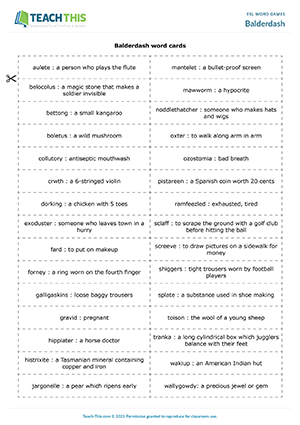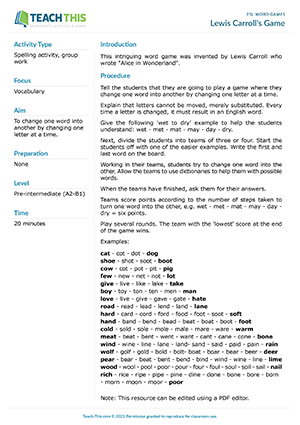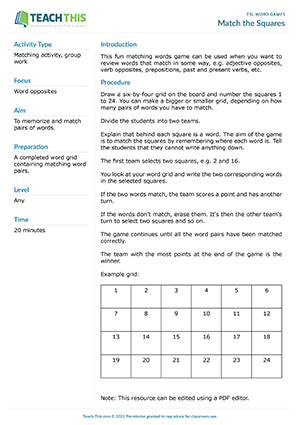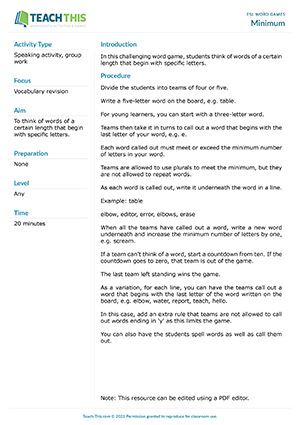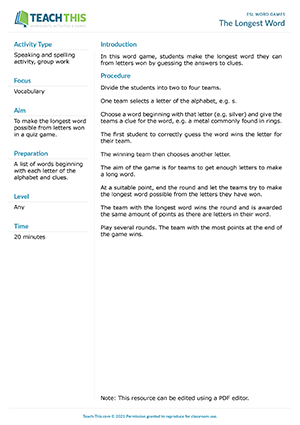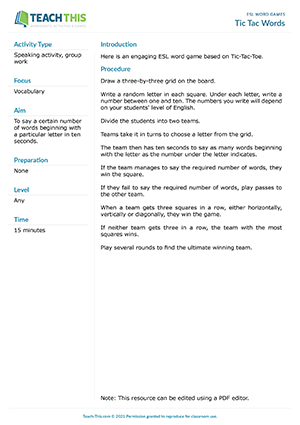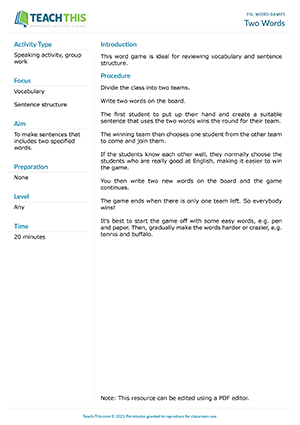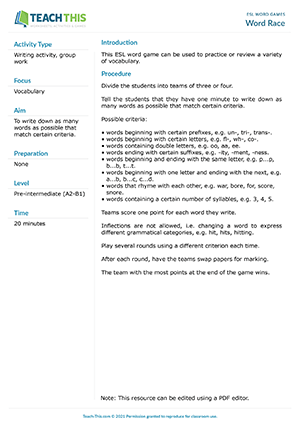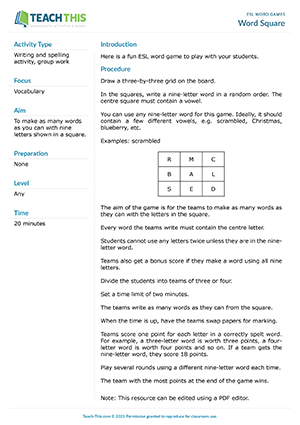You found our list of fun and simple vocabulary games for adults.
Vocabulary games are activities that include language and wordplay. Example games include Word Association and Hang Man. Players can enjoy vocabulary games in person or online. The purpose of these games is to strengthen vocabulary skills. These games are also known as “vocab games”, “letter games” and “vocabulary building games.”
These games make great online classroom activities and communication games, and can be used as online fun activities for employees.
This list includes:
- vocabulary games for adults
- simple vocabulary word games for adults
- fun online vocabulary games and activities
- English vocabulary games
- vocabulary games in English
- games to improve vocabulary
- vocabulary building activities
- vocab review games
- vocabulary games for students
Get ready to play!
List of vocabulary games
From Pictionary to word scrambles to synonym memory, here is a list of fun word games to play in classrooms, at parties, or during meetings.
1. Vocabulary Pictionary
Pictionary is a game of charades where players draw words instead of acting them out.
To play:
- Split the group into teams.
- Each round, assign one team member to draw.
- Give the drawing team member a word.
- Allow up to sixty seconds for teammates to guess.
- If the team guesses correctly, then assign one point.
You can give other teams the opportunity to steal, or move onto the next team’s turn. The game is a great way to practice new vocabulary, as players connect the word with an image. Pictionary is a fun game for virtual parties or in-person affairs.
To play Pictionary online, draw on the whiteboard app feature on your online meeting software.
2. Word Association
Word Association is one of the best vocabulary games for kids and classrooms since playing does not require a large vocabulary. The rules are simple and easy to understand. Typically, the game involves two players.
To play:
- Player one says a word.
- Player two responds with the first word that comes to mind.
- Player one either chooses a new word or responds to player two’s word.
- The game continues until one player repeats a word or pauses too long.
The rapid pace of the game generates excitement and occasionally results in funny answers.
If a student makes a mistake, then the teacher can pause the game and ask the student to explain or find a more fitting word. Ideally, gamemasters should allow players a few extra seconds to respond. Players should never feel embarrassed. There are no wrong answers in word association, but the game can serve as a learning opportunity to find better words.
If playing via Zoom, then player one or the teacher speaks a word, and other students answer in the chat. The class counts up matching answers and discusses different responses, guessing the reasoning behind each answer.
3. Vocabulary Hangman
Hangman is a classic chalkboard word game that translates easily to online play, thanks to digital whiteboards.
To play:
- Assign a player a word.
- The player draws a series of blanks corresponding to the number of letters in the word.
- Other players guess letters.
- If the letter is in the word, then the “executioner” fills in the blank. If not, then the executioner draws one portion of the gallows.
- The game ends when players guess the word, or when the picture is complete.
The best words to use for hangman contain less-used letters like z, x, and q. Examples of hard hangman words include zigzagging, razzmatazz, and quadrants.
4. Word search
Word searches are common classroom vocabulary games. These activities work well for handouts, and you can play during video calls by using the whiteboard feature and enabling annotation.
We made a sample word search you can use.
To make the game more competitive and exciting, turn the challenge into a race and award prizes to the first players to complete the puzzles.
5. Crossword
Crossword puzzles consist of a series of interconnecting boxes, each of which starts blank but contains one letter by the end of the game. Under the puzzle are two lists of clues, across and down respectively. Solvers need to consider the meaning of words, number of letters, and surrounding words, making the game strategic as well as literary.
Here is an example of a crossword puzzle you can use with your class or team.
Here is the answer key.
Crosswords are great word games for any age or skill level because puzzle makers can adjust the difficulty to suit players. To make your own crossword puzzle, use an online crossword creator.
6. Word Scramble
Word scrambles make great games for English class, and adults enjoy these language brain teasers as well. Simply mix up the order of the letters and ask players to unscramble and identify the original words.
Here is a sample to start with.
And here is the answer key.
To make your own word scrambles, use an online letter randomizer.
7. Scrabble
Scrabble is one of the most popular word games for adults or children. Players must use letter tiles to assemble words on the game board.
To play:
- Each player draws seven letter tiles.
- During turns, players can play tiles or exchange them for new letters.
- Players build words on the board, with each new word connecting to an existing word.
- Tiles have a point value assigned depending on the challenge of the letter. When a player makes a word, tally the letter and add the score to the point board.
More challenging letters have higher point values. For example, E is one point, while Z is ten. To find the point values for each tile and read more gameplay tips, check out this guide from Hasbro.
To coordinate the game for language lessons, assign higher scores for vocabulary words, and ask players to use the words in a sentence for extra points.
Scrabble is easy to play online, too, making it one of the best online vocabulary games. To play virtually, simply find a multiplayer online version of the game, such as Words With Friends.
8. Scattergories
Scattergories is one of the most fun and simple word games for adults. The game challenges players to think up words all starting with the same letter.
To play:
- One player rolls a letter die or uses a letter generator to pick the first letter.
- The timekeeper puts 60 seconds on the clock.
- Players write down one answer per category starting with the letter.
- When time runs out, players read the answers.
- Players receive a point for every answer.
Alliterative phrases count for double or triple points. If two players have the same answer, then they must cross it out and neither receives points. Of course, a player will not receive points for blank answers either. At the end of each round, the player with the most points wins.
Here is a list of sample Scattergories categories:
- A boy’s name, girl’s name, or gender neutral name
- Capital cities
- Four letter words
- Types of drinks
- Holidays
- Careers or professions
- Cartoon characters
- Websites
- Desserts
You could create more inventive categories for the game, or challenge players to make up prompts.
To play virtually, use the chat, screen-share, whiteboard functions in your virtual meeting platform. You can also share a Google Doc or Form, or join a multiplayer online Scattergories game together.
9. Tree or Bob Ross
Tree or Bob Ross is a fun video conference game that challenges players to guess a word by asking questions.
The player who conjures the word is The Post. The Post answers This or That questions whose answers help players narrow down the word.
The first question of the game is usually “is it more like a tree, or more like Bob Ross?” and The Post must answer accordingly. For instance, a rose is probably more like a tree, but Pinnochio presents an interesting challenge.
Each turn, the guesser adds a new word. For example, the second question might be, “is it more like a tree or a fern?” The game continues until players guess correctly. For more excitement, introduce a time limit, or award more points if players guess the word during earlier rounds.
10. Vocabulary Pyramid
Pyramid challenges players to guess words from context clues. The pyramid is a collection of six words, arranged with three on the bottom, two in the middle, and one at the top. To win, teams must guess all words within the pyramid in the allotted time.
To play:
- Divide the group into teams.
- Give one player on each team the pyramid.
- The pyramid holder must give hints to teammates describing each word without using the actual name of the item.
- When players guess correctly, the pyramid master can move to the next word. Or, players can say “pass,” and return to the word later.
- Teams receive a point for every correct guess.
When determining the time limit, consider the age of your players and the difficulty of the words. In general, 30 seconds per word, or three minutes total, is a good place to start, but add or take away time to increase or decrease the challenge.
11. Invisible Bridge
Invisible Bridge is similar to six degrees of Kevin Bacon. In both games, you must figure out a way to connect two seemingly distant concepts. Six degrees of Kevin Bacon uses actors, while Invisible Bridge uses words.
To play:
- A player suggests two unrelated words.
- Player one gives a number of planks. This is how many steps other players must use to relate the two words.
- The other players think up words that share similar traits, synonyms, or connector words to move from one term to another.
An example round might look as follows:
Tiger, Astronaut, eight planks
Tiger – Balm – Lip – Service – Customer – Happy – Pills – Capsules – Space – Astronaut
Meanwhile, Tiger, Astronaut, two planks might look like this:
Tiger – meat eater – meteor – Astronaut
One fun aspect about this game is there can be more than one correct answer, and opposing teams can dispute far-reaches. Invisible bridge encourages players to think about the nature of language and the relationship between words.
12. Poetry Improv
Poetry Improv is an exercise that challenges participants to craft verses on the spot.
To play:
- Pick a poetry style, such as sonnet, haiku, acrostic, limerick, or free verse.
- Give participants vocabulary words to use within the poem.
- Allow five or ten minutes for groups or individuals to complete the verses. If playing online via meeting software, then send groups to breakout rooms to work.
- Ask poets to share the masterpieces aloud.
For extra fun, turn other players into judges by asking them to rate the poems by holding up scorecards. To make the game more fast-paced, ask players to finish each others’ phrases on the spot for a true poetic improv.
13. Synonym Memory
The rules of Memory are easy: flip over two cards at a time and look for matching pictures or words. When players find pairs, they take the cards off the board. The player with the most pairs of cards at the end of the game wins.
Synonym Memory puts a challenging spin on the simple game. Instead of hunting for exact matches, players pair up words with synonyms.
Here are some sample matches:
- enticing/tempting
- assume/suppose
- patience/restraint
- revoke/rescind
- impact/collision
The game encourages players to think in different ways, as participants will need to remember the location of the cards as well as consider meanings of words.
To play online, make your own virtual synonym memory game with an online tool and share screens to play, with one player flipping over the cards at other players’ request.
List of words to use for vocabulary games
Here is a list of great words to use in word games:
- serendipity
- fortitude
- akimbo
- sumptuous
- ineffable
- zephyr
- incorrigible
- medallion
- mauve
- bombast
- denouement
- contemporary
- gossamer
- inane
- hippodrome
- concession
- ideology
- quintessential
- prescient
- regurgitate
- gnash
- cataclysmic
- knell
For further inspiration, use a random word generator or consult online lists of difficult or intersecting words.
Conclusion
Vocabulary games and activities test and strengthen players’ communication skills. These word games minimize frustration by disguising language lessons in the form of an exciting challenge. Not to mention, simple word games are fun for adults and kids alike, and make great icebreaker activities during meetings. Most games only require words and a way to share them, so playing word games online via Zoom or similar platforms is easy.
For even more smart fun, check out our posts on problem solving games, question games and team building brain teasers.
FAQ: Vocabulary Games
Here are answers to common questions about vocabulary games and activities.
What are vocabulary games?
Vocabulary games are word and language games you can play with students, coworkers, or family and friends. These games challenge players to hunt for words or definitions, brainstorm terms, deduce phrases based on clues, or create words under certain conditions. Language games are a great way to teach new vocabulary and help students practice recognizing and using new words. These activities are also known as “vocabulary building games” and “vocab games”, and are similar to “word games” and “letter games”.
What are some fun word games for groups?
Some fun word games for groups include Pictionary, Tree or Bob Ross, and word scrambles.
What are some online vocabulary games?
By using virtual meeting software like Zoom, you can play any word game online. Some good virtual vocabulary games include Scrabble, Scattergories, and online crossword puzzles.
What are good ESL word games?
The best ESL word games are easy to understand and play yet expand the vocabularies of participants. Good ESL word games include word association, word searches, and hangman.
What are fun ways to teach vocabulary?
Word games are one of the most fun and easy ways to teach vocabulary. While some kids get frustrated with straightforward reading or language exercises, word games disguise vocabulary lessons as a fun challenge. Plus, playing language games together is a great teamwork exercise.
The acquisition of new vocabulary is essential in terms of overall language advancement. However, there is always a need to review active words from time to time in order to use them fluently in speech. Here, we will present a couple of great vocabulary revision games which will perk up every classroom. Through these games the learners will feel how fun, entertaining and effective the learning process can be.
1. Charades
Charades is a fun and cool revision game. Students need to practice their acting skills to explain the words. This game is extremely easy to organize with minimal advance preparation. The only thing to be ready for is to keep a collection of vocabulary cards for the words you have studied.
The class is divided into two teams. Each team member takes turns acting out one of the words from the vocabulary set and explains it by acting out the word. If his or her own team can’t guess the word, the opposite team gets the chance to guess it. Each right answer equals one point.
Skyeng ищет преподавателей английского. Подробности по ссылке: Skyeng
2. Pictionary
Pictionary is also an entertaining game to play for vocabulary review. The rules are similar to those of charades except that instead of acting out the word, it is drawn on the board.
3. Bingo
Bingo can serve as a good revision game. From my experience, most of the groups/students like playing bingo because it gives them the chance to reflect on the words they have digested.
Students are given a blank bingo board and are asked to put the review words into the squares randomly. The teacher puts the active words in a hat or a box, takes them out one by one and defines them. If the student has a word corresponding to the definition, he crosses it out on his bingo board. When someone gets five squares in a row, they should shout, “Bingo!”
Check these articles out as well:
4. A memory style
A memory style card game can be another effective way for reviewing vocabulary. It requires some preparation before the game starts. For each word to be reviewed, one card should have the target vocabulary word and another card should have the definition of the word. You also need to have a big playing grid where you put the words and their definitions face down.
Each person turns over two cards each turn trying to find a match. If the cards do not match, he turns them over again and the next person tries to find a match. If he succeeds, he keeps the cards and gets an additional turn. The player with the highest number of cards at the end of the game wins.
The game can be modified even further. If you have accumulated enough synonyms or antonyms to the target vocabulary, you can practice matching target words to their antonyms or synonyms.
5. Categories
Categories is another awesome revision game which will make students energized and empowered. What they need for the game is to draw 4-6 columns on their paper and write a category at the top of each column. Categories fit the topics covered during the course. For example, if you have covered the business topics of Marketing, Work and Leisure, Ethics, Human Resources, Travel, you write these topics as categories.
You time the students and ask them to write as many words as possible under each category. As a further modification, choose a random letter and write it on the board. Give students enough time to write down a word for each category that starts with that letter.
Экономьте время на подготовку к урокам и проверку домашних заданий со Skyeng. Удаленный формат занятий, защита от внезапных отмен и график, который настроен специально под вас. Присоединяйтесь к нашей команде. Подробности по ссылке: Skyeng
6. Letter scramble
Letter scramble will make students really competitive and super fast. What you need is to take a list of words that your students have recently learned and write a scrambled version of each on the board. Students need to unscramble the words on their paper. The first one to finish deciphering all the words wins.
7. Stop the bus
Stop the bus is a cool game my students adore. I usually divide the class into 2-3 teams. One student from each team. This student sits on a chair facing his peers. Then from behind the student in the hot seat, show the other students a word from the lesson. The other students must try to describe what the word is without saying the actual word. And the student in the hot seat must guess.
The student who guesses the word shouts out “stop the bus” and checks the word with the teacher. If correct, the team gets a point. If wrong, other teams have the chance to guess the word by writing their versions on a piece of paper and passing the papers to the teacher.
8. Puzzles
Puzzles is another cool and easy tool to review the material in an effective way. What I like about this way of vocabulary revision is that students can work in pairs or groups while trying to find words matching the definition in the crosswords. They learn by listening to each other, cooperating to find the right answer. In this way, they both review the material and improve their teamwork skills.
Follow this link to get templates of different types of puzzles.
We also recommend watching a video with Alexei Konobeev. The speaker shared games to help your students remember new vocabulary. These games do not require special training and you can adapt them to any age and level.
We hope that all these games would serve their best to liven your vocabulary revision sessions and make them more meaningful and effective.
Which of these games have you tried? Which ones have you picked up for your next revision slot?
If you want to improve your writing, maybe it’s time to ditch all the writing books and podcasts and play some word games instead.
Yes, seriously! Word games and writing games are great ways to develop your vocabulary, to help you think more deeply about words, to have fun with story and structure, and to get a lot of fun out of writing.
But games can be a great way to:
- Develop your vocabulary
- Help you think more deeply about words
- Become more fluent in English (if it’s a foreign language for you)
- Invent and develop characters
… and much more.
After the list of 50 writing games, I’ve given you a top ten that I think are particularly great for kids who want to practice their writing skills. Many of the other games are suitable for children, too, so by all means try out other games as a family if you want to.
Of course, there are loads of online games (and quizzes and tools) that you can use to improve your writing skills, and I will be talking about some of the best of those. But there are also lots of tried-and-tested classic games that you can play with pen and paper, or using cards and dice … and we’ll be taking a look at those first.
5 Pen and Paper Word Games
I’ll start with the simplest games: pen and paper ones that you can play pretty much anywhere, so long as you have a pen.
All of these are suitable for children, and some (like crosswords) are enjoyed by many adults too.
#1: Hangman (2+ players)
Hangman is a classic word game for two players. One player thinks of a word and writes down dashes to represent the number of letters. The other guesses letters of the alphabet. Correct letters are inserted into the word; incorrect letters result in another segment of the “hangman” being drawn.
This is a great game for developing spelling and vocabulary. If you’re playing it with small children, you can do it without the perhaps rather unpleasant “hangman” element, and just count how many guesses each player takes!
#2: Crosswords (1 player)
A crossword is a grid of white and black squares, where each white square is one letter of a word. The words intersect. You can find crosswords in many newspapers and magazines (on all sorts of subjects), and you can buy booklets and books full of them. Some crosswords are “cryptic”: great if you like brainteasers. Others have more straightforward clues.
Crosswords are great if you want to learn new words and definitions, or (at the cryptic end of the scale) if you enjoy playing with words and language. Simple ones are suitable for fairly young children, with a little help.
#3: Word searches (1 player)
A word search has a grid (often 10×10 or more) filled with letters, and a number of words written alongside or beneath the grid. The person completing the word search needs to find those words within the grid.
Most word searches are easy enough for children, though younger children will struggle with backward and diagonal words. They’re a good way to get used to letter patterns and to improve spelling – and because word searches rely on matching letters, even children who can’t read well will be able to complete simple ones.
#4: Consequences (2+ players, ideally 4+)
This is a fun game with a group of people, as you get a wild and wacky mix of ideas. Each player writes down one line of a story and folds the paper over before passing it around the table to the next player. The very simple version we play has five lines: (1) A male name, (2) The word “met” then a female name, (3) “He said …” (4) “She said …” (5) “And then …”
Once all five stages are complete, the players open out the papers and read out the results. This can be great for sparking ideas, or as a way to encourage reluctant writers to have a go.
#5: Bulls and Cows (2 players)
This game, which can also be called “Mastermind” or “Jotto” involves one player thinking up a secret word of a set number of letters. The second player guesses a word; the first player tells them how many letters match in the right position (bulls) and how many letters are correct but in the wrong position (cows).
Our five year old loves this game, and it’s been a great way to develop her spelling and handwriting as well as logical thinking about which letters can or can’t be the correct ones after a few guesses.
10 Board and Dice Games
These are all games you can buy from Amazon (or quite probably your local toyshop). They’re fun ways to foster a love of writing within your family, or to share your enjoyment of words with your friends.
#1: Scrabble (2+ players)
A classic of word games, Scrabble is a game played with letter tiles on a board that’s marked with different squares. (Some squares provide extra points.) Letters have different points values depending on how common they are. The end result of scrabble looks like a crossword: a number of words overlapping with one another.
If you want to develop your vocabulary (particularly of obscure two-letter words…) then Scrabble is a great game to play. It’s suitable for children too, particularly in “Junior” versions.
#2: Boggle (2+ players)
This is less well known than Scrabble, but it was one I enjoyed as a child. To play Boggle, you shake a box full of dice with a letter on each side, and the dice land in the 4×4 grid at the bottom of the box. You then make as many words as you can from the resulting face-up letters.
Again, this is a good one for developing vocabulary – and it can be played by children as well as by adults. You need to write down the words you come up with, which can also be good for developing handwriting.
#3: Pass the Bomb (2+ players)
It’s very simple to play: you deal a card for the round pass a “bomb” around the table and when it goes off, the person holding it loses. Before you can pass the bomb on during your turn, you need to come up with a word that contains the letters on the card.
It’s a fun family or party game, and can work well with a wide range of ages. It’s a great way to help children think about letter patterns, too, and to develop vocabulary and spelling.
#4: Story Cubes (1+ players)
There are lots of different versions of these available, and they all work in a similar way. The open-ended game has a set of cubes that you roll to create ideas for a story that you can tell along with the other players. If you prefer, you can use them to come up with stories that you’re going to write on your own.
There are lots of different ways you can use them: as writing prompts for a school class or group, to make up a bedtime story together with your children, for getting past your own writers’ block, or almost anything you can think of.
#5: Apples to Apples (2+ players)
Apples to Apples has red cards (with the name of a person, place, thing, etc) and green cards (with two different descriptions): the player with a green card selects one of the descriptions, and others have to choose a card from their hand of red cards. The judge for that game decides which red card best matches the description.
If you want to develop your vocabulary (or your kids’), this could be a fun game to play. There are lots of expansions available, plus a “junior” version with simpler words. (If you’re playing with adults, you might also want to consider Cards Against Humanity, a decidedly not-kid-friendly game that works in a very similar way.)
#6: Letter Tycoon (2+ players)
In this game, you have a hand of 7 cards which you can use in conjunction with the 3 “community cards” to create a valuable word. It’s a more strategic game than some others, with aspects of finance (like patents and royalties) involved too – if you’re a budding tycoon, you might really enjoy it.
Because not all the game strategy depends on simply being good with words, it doesn’t matter if some players have a larger vocabulary than others. It’s suitable for children, too, so you can play it as a family game.
#7: Dabble (2+ players)
Dabble is a family-friendly game where you compete with other players to be the first to create five words (of 2, 3, 4, 5 and 6 letters) using your 20 tiles. It’s very simple to get the hang of … but coming up with the words might be more challenging than you expect!
If you enjoy Boggle or Scrabble, you’ll probably have fun with Dabble. It’s a great way to develop both spelling and vocabulary, and to have fun with words.
#8: Upwords (2+ players)
Upwords is like 3D Scrabble: you can stack tiles on top of other tiles to create new words. The board is smaller than a Scrabble board (and doesn’t have double and triple word score squares) so it’s not as complex as it might initially sound.
Like similar games, it’s a great one for building vocabulary and for developing your spelling. It’s suitable for kids, too, so it could be a great game for the whole family.
#9: Tapple (2+ players)
Tapple has a wheel, with most of the letters of the alphabet on it, and lots of different “topic cards” that cover 144 different categories. There are lots of different ways you can play it – the basic rules are that each player has to think of a word that fits the topic within 10 seconds, but that word can’t start with a starting letter that’s been used previously.
While small children might find it a bit too challenging or frustrating, due to the short time limit, this could be a great game for older children looking to extend their vocabulary. All the categories are suitable for kids.
#10: Last Word (2+ players)
In Last Word, players have to come up with answers to “Subject” and “Letter” combinations, racing to get the last word before the buzzer. It works a bit like a combination of “Tapple” and “Pass the Bomb”.
You can easily play it with a large group (there are tokens for up to 8 players, but you could add more without affecting the gameplay). It’s a great way to develop vocabulary and, to some extent, spelling.
5 Roleplaying Games
While my geeky tendencies have been reined in a bit since I had kids, I’ll admit I have a great fondness for roleplaying games: ones where you come up with a character (often, but by no means always in a magic-medieval setting) and play as them. These are some great ones that you might like to try.
#1: Dungeons and Dragons (3+ players)
Although you might never have played Dungeons and Dragons, I’m sure you’ve heard of this classic roleplaying game that’s been around since 1974 and is now onto is 5th edition. It takes rather longer to get to grips with than a board or card game: to play, you need a “Dungeon Master” (essentially the storyteller of the game) and at least two players (who each control a character), plus rulebooks and a lot of different dice.
It’s a great game for developing the “big picture” aspects of writing, like the ability to construct a plot and a story (if you’re the Dungeon Master) and the skills involved with creating a character, giving them a backstory, and acting “in character” as them (if you’re one of the players).
#2: Amazing Tales (1 parent, plus 1 or 2 children)
This is a kid-friendly RPG aimed at parents who want to create a story with their child(ren). It’s like a very simple version of Dungeons and Dragons, and has straightforward but flexible rules. You can play it with a single six-sided dice – though it’s better if you have four dice (with six, eight, ten and twelve sides).
If you want to encourage your child’s creativity and have fun creating stories together, this is a wonderful game to play. The rulebook contains lots of ideas and sample settings, with suggested characters and skills … but you can come up with pretty much any scenario you like.
#3: LARP (Live Action Roleplay) (lots of players)
Over the past decade or so, LARP has become a bit more mainstream than it once was. It’s short for “Live Action Roleplay” … which basically means dressing up as your character and pretending to be them. It’s a bit like Dungeons and Dragons crossed with improv drama.
The nature of LARP is that it needs quite a lot of people, so unless you have loads of friends to rope in, you’ll want to join an organised LARP – there are lots out there, covering all sorts of different themes, from traditional fantasy ones to futuristic sci-fi ones. Some are suitable for children, but do ask event organisers about this. They won’t necessarily involve any sort of writing, but can be a great way to explore characters and dialogue.
#4: MUDs (lots of players)
MUDs, or “multi-user dungeons” have been around since the early days of networked computing in the ‘70s, and are the forerunners of games like Fortnite and World of Warcraft. They’re now distinctly retro-looking text-based online games, where players create a character and interact with other characters and the world.
Like other types of roleplaying game, they’re a great way to practice storytelling and character-development skills. They also involve a lot of writing – so they can be useful for things like vocabulary and spelling. Some are suitable for children, but as with anything online, do ensure your children know how to be safe (e.g. by not giving out their full name, address, etc).
#5: Online Forum Games / Forum Roleplaying (2+ players)
Some fan communities write collaborative fanfiction through forums (here’s an example), with different people posting little pieces as different “characters” to continue a story. These can be quite involved and complex, and they can be a great way to learn the skills of telling a long, detailed story (e.g. if you’re thinking of writing a novel).
They’ll probably appeal most to writers who are already producing fanfiction on their own, and who have a fair amount of time for the back-and-forth required for forum roleplaying. Again, if your child wants to get involved with this type of roleplaying, do make sure you monitor what they’re doing and who they’re interacting with.
10 Word Games You Can Play on Your Phone
These days, many writers are more likely to have their phone to hand than a pen and paper … and to be fair, there’s nothing wrong with that. You can easily make notes on a phone, whether by tapping them in or by recording them. If you find yourself with a bit of time on your hands, why not try one of these writing-related games?
Note: all of these are free to download, but most allow in-app purchases, and you may find you need to make a purchase to get the most out of them.
#1: Bonza Word Puzzle
This game is a bit like a deconstructed crossword: you get bits of the puzzle and you drag them together to form words that will all match with the clue. If you’re a fan of crosswords and want something a bit different, you might just love it.
It’s a great way to think hard about letter patterns and how words are put together, so it might be a good game for older children who’re looking to develop their spelling and vocabulary, too.
#2: Dropwords 2
Dropwords 2 (a rewrite of the original Dropwords) is a word-finding puzzle where letters drop from the top of the screen: if you remember Tetris, you’ll get the idea. It’s a bit like Scrabble or Boggle, and you have to race the clock to make letters out of the words on the screen.
With six different modes (“normall”, “lightning”, “relax”, etc), it’s suitable for children and for people who are learning English, as well as for those wanting to really challenge their vocabulary skills.
#3: Spellspire
Spellspire is a fantasy-style game where you select letters from a grid to create words: the longer the word, the bigger the blast from your magic wand! You can kill monsters, buy better equipment, and make your way to the top of the Spellspire.
If your kids aren’t very motivated to practice their spelling, this could be a great game for them. (Or, let’s face it, for you!) You can also choose to play it against your Facebook friends, adding a competitive element.
#4: TypeShift
This is a relatively simple game that lets you create words from letters arranged on different dials. There are a couple of different ways you can play: by trying to use all the letters on the dials at least once to create words, or by tackling the “Clue Puzzles”, which are a bit like crossword clues.
Again, if you want to develop your spelling and vocabulary, this is a straightforward game that you can use to do so. You can buy extra puzzle packs at a fairly reasonable price, if you find that you want to play it a lot.
#5: Wordalot
This crossword app uses pictures rather than written clues, which is a fun twist. You can use coins to get hints (you can earn these through the game, or purchase them with real money).
If you enjoy doing crosswords but want something a bit different, give this one a try. You might find that as well as helping you develop your spelling and vocabulary, it’s a great way to develop your lateral thinking as you puzzle out the clues.
#6: WordBrain
This game is another one where you have to find hidden, scrambled words within a grid. There are loads of different levels (1180!) and so this could keep you busy for a long time. You can purchase hints – this could potentially see you clocking up quite a spend, though.
All the words are appropriate for children (though some are tricky to spell), so your kids might well enjoy this game too, as a way to develop their spelling and vocabulary.
#7: Ruzzle
Ruzzle works like Boggle, with a 4×4 grid of letters that you use to make words (the letters must be adjacent to one another). You can play it against friends, or simply against random players.
Like the other apps we’ve looked at, it’s a good one for developing your vocabulary and spelling. Some players said it included too many ads, so this is something to be aware of if you plan to use the free version rather than upgrading.
#8: WordWhizzle Search
This is a word search type game with loads of different levels to play. If you enjoy word searches, it’s a great way to carry lots around in your pocket! You can play it alone or with Facebook friends. It’s easy to get to grips with, but the levels get increasingly tricky, so you’re unlikely to get bored quickly.
As with other apps, this is a great one for developing your spelling and vocabulary. Each level has a particular description (words should match with this), so you have to avoid any “decoy” words that don’t match.
#9: 7 Little Words
This game works a bit like a crossword: each puzzle has seven clues, seven mystery words, and 20 tiles that include groups of letters. You need to solve the clues and rearrange the letter types so you can create the answers to the mystery words – so it’s also a bit like an anagram.
There are five different difficulty levels (“easy” to “impossible”) and each game is quick to play, so this could be a good one for kids too. Again, it’s a great way to develop vocabulary and spelling.
#10: Words With Friends
This classic word-building game is hugely popular, and you can play against your Facebook or Twitter friends, or against a random opponent. It works just like Scrabble, where you have seven letter tiles and add them to a board.
You can chat with the opponent in a chat window, so do be aware of this if you’re allowing your kids to play. The game is a great way to develop vocabulary and spelling, and you can play it fairly casually because there’s no time limit on your moves.
10 Word Games You Can Play in Your Browser
What if you want a writing-related game you can play while taking a break at your computer? All of these are games that you can play in your browser: some involve a lot of writing and are essentially story-telling apps, whereas others are essentially digital versions of traditional pen and paper games.
Unless otherwise noted, these games are free. With some free browser games, you’ll see a lot of ads. If this annoys you, or if you’re concerned that the ads may be unsuitable for your children, you may want to opt for premium games instead.
#1: Wild West Hangman
This is a digital version of Hangman, which we covered above. You choose a category for words (e.g. “Countries” or “Fruits And Vegetables”) and then you play it just like regular Hangman.
It’s simple enough for children – but it only takes six wrong guesses for your cowboy to be hanged, too, so it could get frustrating for younger children.
#2: Word Wipe
In Word Wipe, you swipe adjacent tiles (including diagonals) to create words, a bit like in Boggle. The tiles fall down a 10×10 grid (moving into the blank spaces you’ve created when your word disappears from the grid) – your aim is to clear whole rows of the grid.
Since the easiest words to create are short, simple ones, this is a great game for children or for adults who want to get better at spelling.
#3: Sheffer Crossword
As you might expect, this is a crossword game! There’s a different free puzzle each day, and you can choose from puzzles from the past couple of weeks. It looks very much like a traditional crossword, and you simply click on a clue then type in your answer.
The clues are straightforward rather than cryptic, though probably not easy enough to make this a good app for children or for English learners. If you’re a fan of crosswords, this will definitely be a great way to develop your vocabulary, though.
#4: Twine
Twine is a bit different from some of the other games we’ve looked at: it’s a tool for telling interactive stories (a bit like the old “Choose Your Own Adventure” books, or a text-based adventure game). You lay out your story as different cards and create connections between them.
If you want to experiment with interactive fiction, this is a simple, code-free to get started – as reviewer Kitty Horrorshow puts it, “if you can type words and occasionally put brackets around some of those words, you can make a Twine game”. It’s a great way to deepen your understanding of story, plot and narrative.
#5: Storium
Like Twine, Storium is designed to help you tell stories … but these stories are written in collaboration with others. (There’s a great review, with screenshots, here on GeekMom.) You can either join a story as a character within it, or you can narrate a story – so this is a great game for building lots of different big-picture fiction-writing skills.
It’s suitable for teens, but probably involves a bit too much writing for younger children. If you’d like to write fiction but the idea of creating a whole novel on your own seems a bit overwhelming, or if you enjoy roleplaying-type games (like Dungeons and Dragons), then you might just love Storium.
#6: Words for Evil
This game combines a fantasy RPG setting (where you fight monsters, get loot, gain levels and so on), with word games to play along the way. It could be a good way to encourage a reluctant young teen writer to have fun playing with words – or you might simply enjoy playing it yourself.
The word games work in a very similar way to Word Wipe, so if you found that game frustrating, then Words for Evil probably isn’t for you!
#7: First Draft of the Revolution
This game is an interactive story, told in the form of letters (epistolary). It comes at writing from a much more literary angle than many of the other games, and if you’ve studied English literature or creative writing, or if you teach writing, then you might find it particularly interesting.
The graphics are gorgeous – playing the game is like turning the pages of a book. To play First Draft of the Revolution, you make choices about how to rewrite the main character (Juliette’s) draft letters – helping you gain insight into the process of drafting and redrafting, as well as affecting the ongoing story.
#8: Writing Challenge
Writing Challenge can be used alone or with friends, creating a collaborative story by racing against the clock. You can use it as an app on your phone, as well as on your computer, so you can add to your stories at any time.
If you struggle to stay motivated when you’re writing, then Writing Challenge could be a great way to gamify your writing life – and potentially to create collaborative works of fiction.
#9: Plot Generator
Plot Generator works a bit like Mad Libs: you select a particular type of story (e.g. short story, movie script, fairytale) then enter a bunch of words as prompted. The website creates the finished piece for you. There are also options for story ideas (essentially writing prompts), character generators, and much more on the site.
If you’re stuck for an idea, or just want to play around a bit, Plot Generator could be a lot of fun. Some of the options, like Fairy Tale, are great to use with young children – others may not be so suitable, so do vet the different options first.
#10: The Novelist ($9.99)
The Novelist follows the life of Dan Kaplan, a struggling novelist who’s also trying to be a good husband and father. You can make choices about what Dan should do to reach his goals in different areas of his life – and the decisions you make affect what happens next in the game. You are a “ghost” in the house, learning about and influencing the characters.
While there’s not any actual writing involved in the game, it could be a thought-provoking way to explore how writing fits into your own life.
10 Games to Help You Learn to Type
Typing might seem like an odd thing to include on a list of writing games. But so much of writing involves being able to type – and if you’re a slow typist, you’ll find that your fingers can’t keep up with your brain! While most people find that their typing does naturally improve with practice, these games are all quick ways for you (or your kids) to get that practice in a fun way.
Obviously, all of these games should help to improve typing skills: those which involve whole words may also help with spelling and vocabulary. Unless otherwise mentioned, they’re free.
#1: Dance Mat Typing
This game is designed to teach children touch type (type without looking at the keyboard). It starts off with Level 1, teaching you the “home row” (middle row) keys on the keyboard. Other letters are gradually added in as the game progresses.
It’s very much aimed at kids, so teens and adults may find the animated talking goat a bit annoying or patronising! Unlike many other free games, though, it doesn’t include ads.
#2: Spider Typer
This typing game took a while to load for me: you too many find it’s a bit slow. In the game, you type the letters that appear on chameleons that are trying to catch a spider (the chameleons disappear when you hit their letter). The spider keeps rising up into a tree, and if it safely gets there, you move on to the next level.
It’s suitable for kids, and starts off very easy with just letters: if you set it to a harder difficulty, you need to type whole words.
#3: NitroType
This is a competitive typing game where you race a car against friends (or total strangers) by typing the text at the bottom of the screen. It’s a good one for practicing typing whole sentences, including punctuation – not just typing letters or words.
Older children might enjoy it, and any adults with a strong competitive streak! You can compete as a “guest racer”, or you can create an account and login so you can level up and gain rewards like a better car.
#4: TypeRacer
TypeRacer is similar to NitroType: you control a racing car and the faster you type, the faster your car moves. You can practice on your own, enter a typing race, or race against your friends if you prefer.
If you create an account and login, other users can see your username, score, average speed and so on – and they can also send you messages. This could potentially open you up to receiving spam or unwanted communications, so do be aware of this, particularly if you’re allowing your child to play.
#5: The Typing of the Ghosts
In this game, you destroy ghosts by typing the word on them. The graphics are pretty rudimentary, though it is a free game and a good way to practice quickly typing words. It’s suitable for children, and the sound effects (there’s a noise for every letterstroke) may appeal to kids.
You don’t need to create an account or login: you can simply start playing straight away.
#6: Typing Chef
In this game, you type cooking-related words (usually types of equipment). It involves single words and a few double words with a space between at the early levels.
There’s nothing particularly unusual about this game compared with others, though it wasn’t so ad-heavy as some and doesn’t require any registration. It’s good for teaching words and phrases, but not for helping you to learn to type whole sentences.
#7: TypeTastic
This is a fun typing game aimed at young kids, so it starts with the fundamentals. You start by building a keyboard from letter blocks, then learn how to spot letters on the keyboard quickly before learning where those letters are located.
Teachers or parents might be interested in reading about why the game starts with mapping the keyboard. The interface and graphics are pretty good, given that it’s a free game, and it’s designed specifically with young children in mind.
#8: Typer Shark! Delux
This is a free typing game, where you’re a diver exploring the seas. You can choose from different difficulty levels, and – in a mechanic that’s probably by now quite familiar if you’ve played any of the other typing games – you get rid of creatures like sharks by typing the word written on them.
Again, this can help you with your typing speed and accuracy. I found it was a bit slow to load, but it’s not full of ads like some other games.
#9: Typing Attack
In this game, you’re a spaceship, facing enemy spaceships – each with a word written on them. I expect you can guess what you need to do: type the word correctly to destroy the spaceship. Some words are shorter, some longer, and as with other games, there are multiple difficulty settings.
You’ll need to watch an ad before the game loads, which can be annoying, and means that it isn’t necessarily suitable for children.
#10: The Typing of the Dead: Overkill ($14.99)
This game is definitely aimed at adults rather than kids, because it’s a bit gory. It also costs $14.99, so it’s probably one that’ll suit you best if you’re really keen to improve your typing speed – perhaps you do transcription, for instance, or you’re a freelance writer.
To play the game, you type the words that appear in front of the enemies and monsters: each type you type a letter correctly, you send a bullet at them. If you like horror games and films, it could be a fun way to learn to type faster – but it won’t necessarily improve your accuracy with whole sentences.
10 Word Games that Are Particularly Suited to Kids
While I’ve tried to indicate above whether or not the games are suitable for kids, I wanted to list the ten that I’d particularly recommend if you want to help your children get a great start as budding writers.
Several of these are games I play with my five-year-old already; others are games I’m really looking forward to using with her and my son as they get older. I won’t repeat the full descriptions: just scroll back up if you want those.
#1: Word searches (pen and paper) – you can buy whole books of these, or print off free ones. Older kids might have fun creating their own for their friends or siblings.
#2: Bulls and Cows (pen and paper) – you can play this with just a pen and paper (or if you’ve got a really good memory, with nothing at all).
#3: Boggle (board game) – this is simple enough for quite young children to get the hang of it: my five-year-old enjoys playing it with her Granny.
#4: Story Cubes (dice game) – your child can use these on their own to come up with ideas for a story, or you could use them with a group of children – e.g. in a classroom or as part of a club.
#5: Amazing Tales (roleplaying) – this child-friendly RPG is a great way to introduce big-picture storytelling skills, particularly developing a character.
#6: Spellspire (phone app) – a fun spelling/word-creation game your child can play on your phone (and probably a bit more educational than yet another game of Angry Birds).
#7: Wild West Hangman (browser game) – if your child likes hangman but you don’t always have the time to play it with them, this is a good alternative.
#8: First Draft of the Revolution (browser game) – if your teen is interested in writing and/or the French revolution, they might really enjoy this intriguing game based around redrafting letters.
#9: Dance Mat Typing (typing game) – this game from the BBC is high-quality, and designed to appeal to young children. It teaches good typing practice from the start, by explaining correct finger placement on the keys.
#10: TypeTastic – this is another typing game aimed at young children, and this one starts with putting together a keyboard – a great place to begin.
—
Do you have any favourite writing games – of any type? Share them with us in the comments.
Group Word Games for Kids are fun family activities that keep kids engaged and using their heads for hours. These group activities help kids improve language skills while they have a good time.
Learn how to turn the television into a learning tool, or play games that teach kids to turn words inside out. Either way, the whole family is sure to have fun while learning.
On the following pages, you’ll learn Group Word Games for Kids that are great for parties or everyday fun.
Back Talk
Learn how to talk backwards and start to understand backwards speech in Back Talk.
Blankity Blanks
In Blankity Blanks word game, create stories with your family that surprise and entertain.
Story Time Twist
Get your family’s creative juices flowing with this group word game for kids. Inspire each other to weave tall tales and have fun.
Backward & Opposites
This timed group word game challenges both kids and parents. See how quickly you can decode backward and opposite words.
Creative Crossword
Find out how to make a Creative Crossword puzzle with your kids, and then have fun solving it.
Rhyme Time
Test your kid’s rhyming skills with this competitive group word game. Have fun coming up with rhyming words and playing with sounds during Rhyme Time.
Book Page Bingo
Once you teach your kids Book Page Bingo, they’ll be excited to hit the books.
Channel Changer’s Word Search
Make watching television a learning experience with the challenging Channel Changer’s Word Search for kids.
Back Talk teaches kids how to speak backwards and to understand backwards speech. Learn how to play Back Talk on the next page.
Looking for more fun with words? Try:
- Indoor Games for Kids
- Word Games
- Pen Pal Activities
- Word Crafts
Contents
- Back Talk
- Blankity Blanks
- Story Time Twist
- Backward & Opposites
- Creative Crosswords
- Rhyme Time
- Book Page Bingo
- Channel Changer’s Word Search
Back Talk
Back Talk is a group word game for kids that will keep the whole family entertained. Can you talk backward? Nac uoy klat drawkcab?
How to Play Back Talk
What You’ll Need:
- Paper
- Pens or Pencils
- Tape Recorder
Ever imagined what it would be like to say all your words backward? Why not give it a try?
Step One: Write out a few sentences, carefully spelling each word backward.
Step Two: Practice reading the words aloud that way. Once you feel confident, record the backward phrases.
Step Three: Play them for your friends or parents to see if they can figure out the trick!
Teach your kids Blankity Blanks, the group word game for kids that builds vocabulary. Find out how to play on the next page.
Looking for more fun with words? Try:
- Indoor Games for Kids
- Word Games
- Pen Pal Activities
- Word Crafts
Blankity Blanks
Learn to play Blankity Blanks, the group word game for kids that puts a new twist on storytelling. Even ordinary words can take on zany new meanings when you use them in a story.
How to Play Blankity Blanks
What You’ll Need:
- Paper
- Pencils
Step One: Pick out a page from a story you’ve just read, or choose a poem you know. Write down a few of the key words from the story or poem.
Step Two: Now ask your friend or family member to replace those words on the page with words of their own, without reading the story first.
Step Three: Then insert their words in the real story or poem — the results will be rib-tickling surprises that really change the meaning of the story, one random word at a time!
Story Time Twist challenges kids to weave a yarn that incorporates random words. Learn how to play this group word game for kids on the the next page.
Looking for more fun with words? Try:
- Indoor Games for Kids
- Word Games
- Pen Pal Activities
- Word Crafts
Story Time Twist
Story Time Twist is a group word game that gets kids thinking on their feet and using their creativity.
How to Play Story Time Twist
What You’ll Need:
- Scrap Paper
- Tape
- Pens
- 4 Jars or Cans
- Tape Recorder (optional)
Add a crazy new twist to the ancient art of storytelling with a few scraps of paper and your imagination.
Step One: Gather two or more friends together. Ask each friend to come up with four nouns (a person, place, or thing), 4 verbs (action words — like sing, run, fly), four adjectives (words that describe nouns — like round, slippery, blue), and four adverbs (words that describe verbs — like quickly, brightly, differently).
Step Two: Have them write each word on an individual scrap of paper.
Step Three: While your friends are doing this, make a label with paper and tape for each jar. Mark the labels «nouns,» «verbs,» «adjectives,» «adverbs.» Then your friends should drop their words in the appropriate jar.
Step Four: To begin the storytelling, each person should draw one paper from each jar. The first person begins a story, based on the four words they drew. The second adds to the story, using their words, and so on.
Step Five: Record the crazy work of fiction, and play it back later for extra fun. If you don’t have a tape recorder, write the story down to share with others.
Backward & Opposites get kids thinking about language in a whole new way. Read about this group word game for kids on the next page.
Looking for more fun with words? Try:
- Indoor Games for Kids
- Word Games
- Pen Pal Activities
- Word Crafts
Backward & Opposites
Backward & Opposites is a group word game for kids that gets everyone thinking quickly. Woh tsaf nac uoy daer sdrow drawkcab? Can you sort out the ups and downs of ordinary words? These games will help you find out!
How to Play Backward & Opposites
How to Play Backward & Opposites
What You’ll Need:
- 3×5 Index Cards
- Pens
- Pencils
- Clock or Stopwatch
Step One: This brain puzzler sounds easier than it is. Write out ten of your favorite words on ten different 3×5 cards. Then write each word backward on the other side of the index card.
Step Two: Have your friend or a game partner do the same. Take turns showing each other the backward side of the cards. Keep track of how long it takes to solve each backward mystery.
Step Three: For an easier puzzler, consider opposites. Can you tell right from wrong? Black from white? Prove it. Write 25 words with obvious opposites on twenty-five 3×5 cards.
Step Four: On the back of each card, write the opposite of the word. See how long it takes to get a friend or partner to guess the exact opposite and say it out loud.
Creative Crosswords is a group word game that will build everyone’s vocabulary. Find out how to play this group word game for kids on the next page.
Looking for more fun with words? Try:
- Indoor Games for Kids
- Word Games
- Pen Pal Activities
- Word Crafts
Creative Crosswords
Creative Crosswords is a group word game for kids that is both fun to make and to play. Make up your own crossword puzzles, then share them with the family.
How to Make Creative Crosswords
What You’ll Need:
- Paper
- Pens
- Pencils
- Ruler
- Graph Paper
Step One: Add a new twist to an old favorite by making up crossword puzzles based on your favorite hobby, books, animals, or celebrities.
Step Two: Arrange your «down» and «across» words on the graph paper, writing one letter in each square.
Step Three: After you arrange the puzzle words, write your clues to match. Don’t forget to number the words and clues. Try not to make your word clues too difficult.
Step Four: Then copy the puzzle on a clean sheet of paper, and see how long it takes a friend to complete.
Rhyme Time is an infectious word game that your kids will want to play again and again. Learn how to play this group word game for kids on the next page.
Looking for more fun with words? Try:
- Indoor Games for Kids
- Word Games
- Pen Pal Activities
- Word Crafts
Rhyme Time
Rhyme Time is a great way to test your kid’s vocabulary. Time to find out if you’re a true rhyming Simon.
How to Play Rhyme Time
What You’ll Need:
- Notebook Paper
- Stopwatch or Egg Timer
- Pens or Pencils
Step One: Share this word game with a friend or play it solo. Look around the room and find a common object, such as a shoe.
Step Two: Take 30 seconds to write down as many words as you can think of that rhyme with that object (flu, zoo, boo, who, new, etc.).
Step Three: See who comes up with the most words. Or challenge yourself to beat your personal best.
Book Page Bingo is an innovative game that will keep your kids occupied for hours. Get directions for this group word game for kids on the next page.
Looking for more fun with words? Try:
- Indoor Games for Kids
- Word Games
- Pen Pal Activities
- Word Crafts
Book Page Bingo
Book Page Bingo is a competitive group word game for kids that will have them begging to crack the books. Watch your kids search the pages of their favorite books to win!
How to Play Book Page Bingo
What You’ll Need:
- Books
- Bingo Game
- Blank Paper
Step One: Try something new with an old favorite. Pass out one bingo card and five books to each player. As the caller announces each letter/number combination (for example, B 12), players check to see if they have that square on their card.
Step Two: If they do, they must search through their books for the page number (page 12) and find a word that begins with that letter (B). The first person to raise their hand and show that combination, claims that bingo square and covers it on their card.
Step Three: The first person to cover a row — vertical, horizontal, or diagonal — on their card wins the game.
Channel Changer’s Word Search turns watching television into a game that’s active and fun. Learn about this group word game for kids on the next page.
Looking for more fun with words? Try:
- Indoor Games for Kids
- Word Games
- Pen Pal Activities
- Word Crafts
Channel Changer’s Word Search
Channel Changers’ Word Search turns TV time into a fun, competitive group word game for kids. Channel surfing takes on alphabetical appeal!
How to Play Channel Changer’s Word Search
What You’ll Need:
- Paper
- Pencil
- Remote Control
Step One: On a blank piece of notebook paper, make a column listing each letter in the alphabet.
Step Two: Using the remote control, move from channel to channel, searching for words that begin with each letter. Play once, keeping track of how long it takes to complete your alphabetical search.
Step Three: Then play again to beat your own time. To make this a 2-player game, you and a friend can each go after words beginning with every other letter in the alphabet.
Looking for more fun with words? Try:
- Indoor Games for Kids
- Word Games
- Pen Pal Activities
- Word Crafts
Word games are perfect for long road trips or impatient moments when you’re waiting for your food to arrive at a busy restaurant. They’ll also exercise your verbal ability and keep you on your toes. The following games require nothing but a pen and a few sheets of paper; they can be played anywhere with groups of various sizes.
Bag of Nouns
For this game, each player writes three or more nouns on individual scraps of paper and places the scraps in a bag or other container. The players then divide into two or more teams, and the game proceeds in three rounds.
In round one, the team going first chooses a player to draw a noun from the bag. That player must then describe the noun to her teammates without saying the word; the teammates must guess the word. The first player keeps going, drawing new nouns every time the previous one is guessed, while someone times a minute. When the minute is up, the team adds up all the nouns they were able to guess and receives that many points. Then it is the next team’s turn. Round one continues until each player on each team has had a turn describing the nouns to his teammates.
Round two proceeds the same way with the same bag of nouns, except players must make their teammates guess the noun simply by saying one word. Teammates should try to remember the nouns from the previous round to help them guess.
In round three, players must make their teammates guess the noun without using any words at all, but by acting out the word instead. At the end of the three rounds, the team with the most points wins.
Pass the Story
For this game, you will need as many sheets of paper as you have players. Each player begins by writing the first paragraph of a story or narrative, and then passes her sheet of paper to the player to her right. As the stories are passed around, each player adds a new paragraph to the story, altering the course of the narrative as he wishes. When the stories have made it all the way around the circle and are back with the players who started them, take turns reading them aloud. The results are sure to amuse.
Don’t Finish The Word
This game requires no materials at all. The player going first simply selects a letter and says it aloud. The next player must add a second letter to the first letter so that the two letters are the beginning of a word but not a finished word. For example, if the first player says the letter “A,” the second player should not say the letters “N” or “T,” because they would produce finished the words “an” or “at.” He can say the letter “G” because “Ag” is the beginning of possible words, such as agriculture or agrarian. If the third player thinks that no words begin with the letters A and G, she can challenge the second player. If the second player can name a word, however, player 3 loses a point. If a player cannot think of a letter to add to a word, or is forced to complete a word, he or she loses a point.
Word Games with a difference. Play them with friends or in teams. Increase your Vocabulary. Build team spirit. Spin funny stories
Play these
Word Games — Antakshari, Rigmarole, Memory, Dud, Atlas — with kids and have fun with vocabulary and spellings.
If you need more information about games other than the ones found on this page please use the
Contact Us Page.
© For the building blocks picture
If you would like to check out other kinds of games to play with kids, go to
- Paper-pencil games
- Acting games
- Board games
- Self-esteem Games
Word Games 1 : Antakshari. Antakshari is an Indian word which means the last letter. That is what the game is all about.
How many players are needed? The more the merrier. If there are eight players or more you can divide the group into two teams for the game.
How is it played? The non-team version.
1. Everybody sits in a circle.
2. Pick the denner (the player who will start the game): Recite a rhyme — one word per player. The person at which the rhyme ends will start the game.
Possible rhymes: You could choose any of the nursery rhymes that you remember. If not, you can use one of the following. The first one is an Indian rhyme usually used to find the denner. You can use it if you can get your tongue around the words. The second is an English rhyme.
Akkad bakkad bambe bo,
Assi nabbe poore sau,
Sau me laga dhaga,
Chor nikalke bhaga.
Inky pinky ponky,
Daddy had a donkey;
Donkey died, Daddy cried,
Inky pinky ponky.
3. Once the denner has been identified, she starts with any word. (You can decide in the beginning whether you want to use random words in the game or categories of words. The categories could be names of places, things, five-letter or bigger words)
4. You can decide to continue the game clockwise or anti-clockwise.
5. The next person in the circle has to say a word which begins with the last letter of the first word.
6. Like this the game goes on around the circle until the kids decide to stop
7. In the team version, the team thinks up the word. If a team is taking time to think up a word, the other team can use a countdown like the one in the game
Name, Place, Animal, Thing.
8. This game can also be used with songs (my children prefer to use peppy songs and have rip-roaring fun with the game). The players should think up songs which begin with the last letter of the previous song.
Word Games 2: Decode the Concept and Define (NEW)
Play it with any topic. Say you want to practice a set of concepts in Physics like:
- speed
- velocity
- mass
- acceleration etc
Instructions: Give students time, say 1 minute, to encode a concept of their choice. Following are some ways to encode the word ‘mass’
- Nbtt — Every letter in the code appears before the needed letter in the Alphabet
- Matter acts subtly substantial (beginning letter of every word)
- Emeralds say astute psychology (second letter of every word)
- 1311919 (ordinal number of every letter in the Alphabet)
The student will choose one such code or make up something entirely their own. Then in turns, each will present their code to the class. The class has to guess the word and then define the concept.
A student can choose any of the concepts that are being practiced in the class.
Word Games 3: Rigmarole: This is another example for ‘word games’ which is played in group setting. In this game the group spins a story. The more ludicrous the story more the fun.
1. The group sits in a circle and selects a denner using a rhyme (see Antakshari above for sample rhymes)
2. The denner begins to spin the story. The rule is everybody says a couple of sentences at a time and should end their spin with a conjunction.
3. The next person picks up the story and adds her spin. Again the norm is a couple of sentences ending with a conjunction.
4. The aim of the game is to make the story as ludicrous as possible and have fun while spinning the story.
Word Games 4: DUD:
Here is another great word game for kids, which you can use to enable them to learn spellings in a fun way. You’ll need a group of four to five people to play this. The game is called ‘DUD’.
Remember this is a word game and the aim of the game is to escape completing a word and becoming a ‘DUD’. If you complete the word three times in a row you are a ‘dud’.
The first time you complete a word you become a ‘d’. The second time you complete a word you become a ‘u’. The third time you complete a word, you become a ‘d’ and so as a ‘dud’ you are out of the game.
How is this word game played? Let’s imagine that a group of five is playing this word game.
A player begins with a letter (any letter) say ‘A’. The next person can add another letter to this say ‘l’. The third person starts to guess the number of words that could begin with ‘Al’, so she might add ‘t’ as her bit.
Suppose the fourth person says ‘a’, the fifth person has no option but to say ‘r’ and complete the word ‘altar’. As she has completed the word she is penalised by being assigned first ‘D’ of ‘DUD’. As she completes the word ‘altar’ she also calls out ‘D’.
A twist in the game: Suppose the fifth person says ‘i’ instead of ‘r’. The next person in the group might get suspicious that she is trying to bluff her way out of completing the word.
So the first person (remember we are using a group of five people and the person next to the fifth person is the first one) calls out ‘challenge’ to the fifth person.
Now the fifth person is obliged to complete the word or accept the first ‘D’ of the ‘Dud’. So if she knows that there is such a word as ‘altaic’ she can say it and escape being a ‘dud’, or if she was bluffing then she has to call out ‘D’.
After one word is complete the game starts again with another random letter. Whoever gets ‘d’, ‘u’ and ‘d’ first becomes the ‘dud’ and is out of the game. This way the game goes on and whoever remains finally is the winner.
Generally children have fun by bluffing their way through the game and avoiding the completion of a word. There is a lot of laughter when somebody’s bluff is called and she is challenged.
For younger children, have wordcharts displayed in the room, so that they will be encouraged to play. A sample word chart is shown above.
Here’s another word game.
Word Games 5: ATLAS:
Here’s another simple and great word game that you can use in Geography. It’s a great word game to enable children to learn and remember the names of places.
You can use it with any class of facts. You can use it for places, rivers, concepts etc.
A group of 8-10 kids is an ideal number to play this word game. If you have many more kids in your class you can make two to three teams.
The game begins by the group of kids spelling out the word ‘ATLAS’, one letter per kid. Whoever gets to say ‘s’ of Atlas begins the game.
The beginner picks a letter of the Alphabet say ‘A’ and names a place that begins with ‘A’. The next person also names another place beginning with ‘A’. Like this the rest of the group does the same, until the group feels it has exhausted all the places beginning with ‘A’.
Then the group starts the next round with another letter say ‘D’. In this manner the game goes on with the other letters of the Alphabet. Of course, if there are two or three teams, the teacher or the adult decides the letters of the Alphabet that the teams will play with.
The teacher or the adult keeps track of the number of places that each group has been able to recall from each alphabet. The group which is able to recall the most number of places is the winner.
Here’s another word game.
Word Games 6: Dictionary Relay:
This game also doubles as a way to practice the use of the dictionary. The participants are divided into groups of 6 people. Each group is given a dictionary.
The rules of the game:
1. The sequence in which the game will be played is decided in advance, i.e., group 2 follows group 1, which is followed by group 3 and then group 4, until all the groups have taken turns.
2. Each group gets only 30 seconds to answer. The group that does not answer does not get a mark/score. The next group gets the score, if they get the answer.
3. The facilitator initiates the game by a word, say, ‘dictionary’
4. The first group in the sequence has to look in the dictionary for the next word, but which begins with ‘dj’. Suppose the word is ‘djellaba’.
5. The next group has to look up a word which has ‘djf’ or the next possible third letter after ‘dj’
6. The third group looks up a word that is in dictionary sequence upto the 4th letter. The 5th letter is the last in that sequence of dictionary word list. If after the 5th letter there are still groups left, they should start with the next word.
7. The game continues until all the groups in the sequence complete 1 round. Scores are taken stock of at the end of the round. Two to three rounds are played in this manner. The winning group gets an applause.
I played this game for the first time in an English Language Teaching training in Nasik last week. The teachers went overboard over it. I hope you have fun.
Another kind of word game is to use ‘cross and dots’ grid. Here’s a video of this kind of game. Go to the following link on Youtube.
Also get a monthly e-zine ‘Stories for EL’ free for stories that you can use to emphasise experiential learning. Stories and their lessons are easily remembered.
They can also be used to communicate a concept effectively. They add the ‘aha’ or ‘Eureka’ or ‘got it’ factor to presentations and lectures. They are great tools to use in debriefs of games, to drive home a crucial point.
Fill in the form below and subscribe to the free e-zine.
[This website makes money for me, even while I give you all the information on it for free. Surprised?!!! Don’t be. Want to know more about making a website like this one or even a better one and making money from it? Find answers to your questions
here .]
By: Tom King — Updated: 1 Oct 2012
| 

Word games are an important way of helping children to develop their communication skills in a relaxed, enjoyable way. Moreover, most word games will also force kids to rely heavily on memory, logic and vocabulary in a fast-paced environment completely unlike the often dull classroom at school. What’s more, they usually do not require any set-up or equipment, meaning they can be played at any time and for any length of time. This article will discuss some of the word games available to youth group leaders which have proved particularly popular with children of all ages.
Twenty Questions
This game of logic and memory is one of the most popular word games. A simple question and answer game, it involves one volunteer choosing a person, an object or (if your youth group is particularly intelligent) a plant or even a place. The object of the game for the group is simple: figure out what the volunteer is thinking of in twenty questions. For the volunteer, the object is to keep the answer from the group for as long as possible.
It sounds easy, but the group can only ask closed questions that can be answered with a straight ‘Yes’ or ‘No’. The children will quickly cotton on to the fact that the game is made substantially easier if you ask questions which tell you as much information as possible.
Ghost
This is a word game which rewards patience, creativity and a large vocabulary. It works best in small groups of no more than five people, but you could also play it as a team game where each team can confer before making their play. The object of the game is to avoid completing a word. The game is played by each person or team naming a letter.
They must have a word in mind when they do so, however, as other players can challenge if they think that the letter named makes it impossible to create a word. For example, if one player started with ‘Z’ and the next player said ‘X’, it would be very unlikely that they had a genuine word in mind. Of course, sometimes it is worth making up a plausible move, rather than simply accepting that you have lost the round — and often people do not challenge dubious moves!
Superghost
This works exactly the same as Ghost, but rather than simply adding letters to the end of the word that is being created, you can also add letters to the beginning of it. This makes the game a lot more subtle, as well as more difficult, so you may want to start off by playing the normal Ghost and see how your youth group responds to the intellectual demands of the game. It is great fun to play with language, however, and you may find that the children are very positive about this game once they have played it a couple of times.
Other Word Games
There are so many word games available that it really depends on your youth group’s age and intellectual ability to choose the right one for them. Here is a small list of other word games that they may enjoy playing.
- Cheddar Gorge — this functions like Ghost, but instead of adding letters to avoid forming a complete word, each player adds a word and tries to avoid making a complete sentence.
- Teapot — this involves one player or team replacing homophones with the word ‘teapot’ to create bizarre-sounding sentences. The object of the game for the other players is to guess the word that has been replaced. For example, if a player said «Tom ate some teapot chocolate biscuits on the teapot» the word might be ‘plane’.
- The Green Glass Door is a word game where a player already familiar with the ‘trick’ gives clues to other players about what belongs behind the ‘green glass door’. Words that have exactly 2 duplicate letters belong inside the green glass door, so a typical clue might be that ‘Behind the Green Glass Door, you can go to classes at school, but not courses at a university’. This is a great word game to play as it often completely foxes the kids, and teaches them the value of lateral thinking.
Hopefully these word games will stimulate the mind as well as being great fun for all who play them. Enjoy playing word games with your youth group!
You might also like…
Share Your Story, Join the Discussion or Seek Advice..
Validate:
If you’re looking for some ESL games and activities for word categories, then you’re certainly in the right place. Keep on reading for the top 15 that are engaging, interactive and student-centred and can be used for vocabulary categories (jobs, animals, etc.) or various kinds of grammar (past tense verbs, adjectives, etc.).
Word categories ESL games
Word Category Activities and Games
Let’s get into the best word categories games to use with English learners.
#1: Word Categories Volleyball
Divide the class up into two teams and put a row of desks down the middle. Using a balloon, students take turns hitting it back and forth between the two teams. The person hitting it has to say a word belonging to the category (animals, past tense verbs, adjectives, etc.). No word can be repeated.
If the balloon hits the floor or someone doesn’t say a word, the other team gets a point. Keep playing until a certain number of points is reached.
#2: Word Category Board Race
Divide the class up into teams (2-4, depending on the size of class and space on the whiteboard) and have each team line up in front of the whiteboard with one marker per team. Call out a category (animals, food, verbs, etc.) and the first student has to write a word from that category. Then, they pass the marker to the next student who has to do the same and they return to the back of the line. Continue the game for 1-2 minutes and the winner is the team with the most correct words.
#3: A to Z Alphabet Words Categories Game
Unless you teach absolute beginners, it’s likely that your students already know a bunch of words in any given category. In this case, consider using this as a warmer activity to help students activate their prior knowledge about a topic. Or, use it as a review at the end of class.
The way it works is that in pairs or small groups, students have to write down the alphabet on a piece of paper. Then, students have to write down a word that starts with each letter belonging to that certain category. For example jobs.
A =
B = baseball player
C =
D = doctor
E =
F = fisherman
The team with the most words at the end of the allotted time is the winner. Check it out:
www.eslactivity.org/a-to-z-game
#4: Flyswatter Game
This is a nice game for creating some serious excitement in the classroom! If the word categories are related to vocabulary (jobs for example), then fill the board with a bunch of those. One student from each team comes to the whiteboard and takes a flyswatter. Give some hints about the world and the first student to slap the correct one gets a point for their team. Erase the word and add a new one.
If you’re focusing on categories of words related to grammar and building sentences, then fill the board with nouns, verbs, adjectives, etc. Tell students to find a verb. The first student to slap one gets a chance to make a sentence with that word and if they do, they get a point for their team. Find out more:
www.eslactivity.org/flyswatter-esl-vocabulary-game-for-kids
Category game list
#5: Word Category Concentration
This is a challenging memory game that works well for categories of words. Make up a bunch of matching cards that have a general category and then a specific item. Around 16 is a good number. For example:
- food—apple
- sport—soccer
- job—teacher
- etc.
Then, put students into groups of 3-4 and give each group a set of cards and it essentially becomes a vocabulary and matching memory game. Learn how to do it:
www.eslactivity.org/concentration-an-esl-vocabulary-game
#6: Categories ESL Speaking Lesson
It’s quite easy to plan your own lessons about almost anything. Check out this video for the simple steps to follow:
#7: Word Association
Unless students are absolute beginners, it’s likely that they already know a good amount of vocabulary from a lot of different word categories (animals, jobs, clothing, food, adverbs, adjectives, etc.). If this is the case, doing something like this word association activity can be quite helpful for helping student activate their prior knowledge before jumping into the new stuff.
It’s basically a brainstorming exercise. More advanced, older students can do it in pairs while younger beginners can do it together as a class. Have a look here:
www.eslactivity.org/word-association-an-esl-vocabulary-activity
#8: Memory Circle Word Categories Game
This is a fun memory game that works well for kids. Call out a certain category (jobs) and the first student has to say a word (doctor). The second student says doctor and then adds their own word (truck driver). And so on it continues until someone misses or can’t add their own word. They sit down and are out of the game. Continue until time is up or until 1-2 people are left standing.
#9: Odd One Out
This is a nice word category game to try out with beginners. It can be used for vocabulary or grammatical concepts. Write down groups of four words, one of which doesn’t match:
- doctor, truck driver, hockey, teacher
- go, teach, eat, walked
In this first case, hockey doesn’t fit because it’s not a job. In the second case, walked because it’s a past tense verb. Multiple answers may be possible which I accept as long as students are able to support it with a reason. Check it out:
#10: Word Categories Survey
Just ask my students and they’ll tell you how much I love doing surveys in my classes! They cover a range of skills, get students out of their seats and moving around the classroom and can be used for almost any topic, grammar point or vocabulary set. Of course, it’s possible to use them for any word category (jobs, travel, sports, hobbies, etc.).
The better news is that it’s easy to make your own in just a few minutes once you get some practice with it. Find out how:
www.eslactivity.org/esl-surveys
#11: Ball Toss Word Categories Game
Try out this fun game with kids. Write down a bunch of categories (job, food, city, etc.) using a marker on the beach ball. Then, students toss the ball around the classroom. Whoever catches the ball has to say a word from the category that their right thumb is touching. My rule is that no word can be repeated. Check it out:
www.eslactivity.org/ball-toss-4-skills-esl-activity
#12: Listening for One Specific Word Category
Teaching listening skills can be a bit challenging. However, a way to make it a bit easier for our students is to get them to listen for one specific thing. In this case, it could be to take notes on all the jobs that they hear mentioned. Or, all the examples of past tense verbs. Base it on whatever category of words you’re teaching. More details here:
ESL Listening Activities, Games, Worksheets, and Lesson Plans
#13: Charades
To review words in categories, consider using charades. Have a look at this video for all the details you need to know:
#14: Dictogloss
This is a challenging listening activity for more advanced level students. Find (or write) a passage that contains lots of words from the target category. Then put students into pairs and read it out at a faster than normal pace. Students have to take notes and try to recreate what they just heard.
Read it out again quickly and students do the same thing. Finally, they can compare what they have with the original version. The teacher can highlight the words from a certain category (with the students’ help of course). Check it out:
www.eslactivity.org/dictogloss-esl-listening-and-speaking-activity
#15: Name 5 Things in a Word Category
This is a fast-paced warm-up game that’s ideal for word categories. In groups, students have to write down 5 things that belong to a certain category. Some easy ones are food, animals, things they can see in the classroom, etc. More advanced students can do things like things are good for the environment, things they can see that are yellow, habits that may cause cancer, etc.
The team that finishes first puts up their hands and that round is done.
#16: Appearance Adjectives
A common category of words is adjectives to describe people’s appearance. Here are some of my favourite games and activities:
Appearance Adjectives ESL Activities.
Did you like these Word Categories Games?
Yes? Then you’re going to want to check out this book over on Amazon: 101 ESL Activities for Teenagers and Adults. The key to better English classes is a wide variety of interesting, engaging, and interactive activities and games and this book will help you with just that.
Pick up a copy to keep on the bookshelf in your office to use as a handy reference guide. Or, take the digital version with you on any device to your favourite coffee shop for some lesson planning on the go. Finally, consider listening to the audio version while commuting to work for a serious dose of inspiration for teaching.
Whatever the case, pick up a copy of the book today and get ready some ESL teaching awesome in your life. Head over to Amazon to find out more:
Have your say about Words Categories Games and Activities
What’s your top pick for word categories games? Is it one of the options from this list or do you have another one that you’d like to recommend? Leave a comment below and let us know what you think. We’d love to hear from you.
Also be sure to give this article a share on Facebook, Pinterest, or Twitter. It’ll help other busy English teachers, like yourself, find this useful resource.
Word categories games
Last update on 2022-07-17 / Affiliate links / Images from Amazon Product Advertising API
A Ship Comes Loaded
ESL Word Game — Vocabulary and Speaking: Memorisation, Forming Words from Prompts — Any Level — 15 minutes
In this ESL word game, students remember and say words beginning with a certain letter. Have the students sit in a circle. Ask the students to choose a letter of the alphabet, e.g. B. Explain that the aim of the game is to say a word beginning with the chosen letter and to remember what answers other students have given. Start the game by saying ‘A ship comes loaded…’ The first student replies ‘with what?’, and you say a word beginning with the chosen letter, e.g. ‘with bananas’. The first student then says ‘A ship comes loaded…’ to the second student. The second student replies ‘with what?’ The first student then repeats your word and gives their own answer, e.g. ‘with bananas and bears’. This continues around the circle. If a student fails to come up with a word, forgets what answers have been given or repeats a word, they are out of the game. The last student left standing wins the game.
Balderdash
ESL Defining Words Game — Vocabulary and Writing: Writing Definitions, True or False, Guessing — Group Work — Upper-intermediate (B2) — 25 minutes
This ESL word game is based on a popular board game of the same name. In the game, students invent false definitions for words and score points by correctly guessing true definitions. Give each group a set of balderdash word cards. The leader of the round chooses one of their word cards, reads the word aloud and spells it. The other students then each invent a short false definition for the word that could fool the other group members and write it on a slip of paper. The leader also copies the true definition onto a slip of paper. Each student then hands their definition to the leader who mixes them up and then reads each one aloud. The other students then vote on which definition they think is correct and the leader reveals the answer. Students score one point for each vote their false definition receives and two points for choosing the correct definition. The leader scores three points if nobody chooses the correct definition. The scores are added up and another student becomes the new leader and so on. The student with the most points at the end of the game wins.
Lewis Carroll’s Game
ESL Word Game — Vocabulary and Spelling: Forming Words from Prompts — Group Work — Pre-intermediate (A2-B1) — 20 minutes
This intriguing word game was invented by Lewis Carroll who wrote «Alice in Wonderland». Tell the students that they are going to play a game where they change one word into another by changing one letter at a time. Explain that letters cannot be moved, merely substituted. Every time a letter is changed, it must result in an English word. Give the following ‘wet to dry’ example to help the students understand: wet — met — mat — may — day — dry. Start the students off with one of the easier examples. Write the first and last word on the board. Working in teams, students try to change one word into the other. Allow the teams to use dictionaries to help them with possible words. When the teams have finished, ask them for their answers. Teams score points according to the number of steps taken to turn one word into the other, e.g. wet — met — mat — may — day — dry = six points. Play several rounds. The team with the ‘lowest’ score at the end of the game wins.
Match the Squares
ESL Word Game — Vocabulary: Memorisation, Matching — Group Work — Any Level — 20 minutes
This fun matching words game can be used when you want to review words that match in some way, e.g. adjective opposites, verb opposites, prepositions, past and present verbs, etc. Draw a six-by-four grid on the board and number the squares 1 to 24. Explain that behind each square is a word. The aim of the game is to match the squares by remembering where each word is. Tell the students that they cannot write anything down. The first team selects two squares, e.g. 2 and 16. You look at your word grid and write the two corresponding words in the selected squares. If the two words match, the team scores a point and has another turn. If the words don’t match, erase them. It’s then the other team’s turn to select two squares and so on. The game continues until all the word pairs have been matched correctly. The team with the most points at the end of the game is the winner.
Minimum
ESL Word Game — Vocabulary: Forming Words from Prompts — Group Work — Any Level — 20 minutes
In this challenging word game, students form words of a certain length that begin with specific letters. Write a five-letter word on the board, e.g. table. For young learners, start with a three-letter word. Teams then take it in turns to call out a word that begins with the last letter of your word, e.g. e. Each word called out must meet or exceed the minimum number of letters in your word. Teams are allowed to use plurals to meet the minimum, but they are not allowed to repeat words. As each word is called out, write it underneath the word in a line, e.g. elbow, editor, error, elbows, erase. When all the teams have called out a word, write a new word underneath and increase the minimum number of letters by one, e.g. scream. If a team can’t think of a word, start a countdown from ten. If the countdown goes to zero, that team is out of the game. The last team left standing wins the game. As a variation, for each line, teams call out a word that begins with the last letter of the word written on the board, e.g. elbow, water, report, teach, hello. You can also have the students spell words as well as call them out.
The Longest Word
ESL Word Game — Vocabulary and Spelling: Answering Questions, Guessing, Forming Words — Group Work — Any Level — 20 minutes
In this word game, students make the longest word they can from letters won by guessing the answers to clues. One team selects a letter of the alphabet, e.g. s. Choose a word beginning with that letter, e.g. silver. Then, give the teams a clue for the word, e.g. a metal commonly found in rings. The first student to correctly guess the word wins the letter for their team. The winning team then chooses another letter. The aim of the game is for teams to get enough letters to make a long word. At a suitable point, end the round and let the teams try to make the longest word possible from the letters they have won. The team with the longest word wins the round and is awarded the same amount of points as there are letters in their word. Play several rounds. The team with the most points at the end of the game wins.
Tic Tac Words
ESL Word Game — Vocabulary: Forming Words from Prompts — Group Work — Any Level — 15 minutes
Here is an engaging ESL word game based on Tic-Tac-Toe. Draw a three-by-three grid on the board. Write a random letter in each square. Under each letter, write a number between one and ten. Teams then take it in turns to choose a letter from the grid. The team then has ten seconds to say as many words beginning with the letter as the number under the letter indicates. If the team manages to say the required number of words, they win the square. If they fail to say the required number of words, play passes to the other team. When a team gets three squares in a row, either horizontally, vertically or diagonally, they win the game. If neither team gets three in a row, the team with the most squares wins. Play several rounds to find the ultimate winning team.
Two Words
ESL Word Game — Vocabulary and Speaking: Forming Sentences from Prompts — Group Work — Any Level — 20 minutes
This word game is ideal for reviewing vocabulary and sentence structure. Write two words on the board. The first student to put up their hand and create a suitable sentence that uses the two words wins the round for their team. The winning team then chooses one student from the other team to come and join them. If the students know each other well, they normally choose the students who are really good at English, making it easier to win the game. You then write two new words on the board and the game continues. The game ends when there is only one team left. So everybody wins! It’s best to start the game off with some easy words, e.g. pen and paper. Then, gradually make the words harder or crazier, e.g. tennis and buffalo.
Word Race
ESL Word Game — Vocabulary and Writing: Forming Words from Prompts — Group Work — Pre-intermediate (A2-B1) — 20 minutes
This ESL word game can be used to practice or review a variety of vocabulary. Tell the students that they have one minute to write down as many words as possible that match certain criteria, e.g. words beginning with certain prefixes, certain letters, words that rhyme, etc. Teams score one point for each word they write. Inflections are not allowed, i.e. changing a word to express different grammatical categories, e.g. hit, hits, hitting. Play several rounds using a different criterion each time. After each round, teams swap papers for marking. The team with the most points at the end of the game wins.
Word Square
ESL Word Game — Vocabulary and Spelling: Forming Words from Prompts — Group Work — Any Level — 20 minutes
Here is a fun ESL word game to play with your students. Draw a three-by-three grid on the board. In the squares, write a nine-letter word in a random order. The centre square must contain a vowel. The aim of the game is for the teams to make as many words as they can with the letters in the square. Every word the teams write must contain the centre letter. Students cannot use any letters twice unless they are in the nine-letter word. Teams also get a bonus score if they make a word using all nine letters. Set a time limit of two minutes. The teams write as many words as they can from the square. When the time is up, teams swap papers for marking. Teams score one point for each letter in a correctly spelt word. For example, a three-letter word is worth three points, a four-letter word is worth four points and so on. If a team gets the nine-letter word, they score 18 points. Play several rounds using a different nine-letter word each time. The team with the most points at the end of the game wins.

